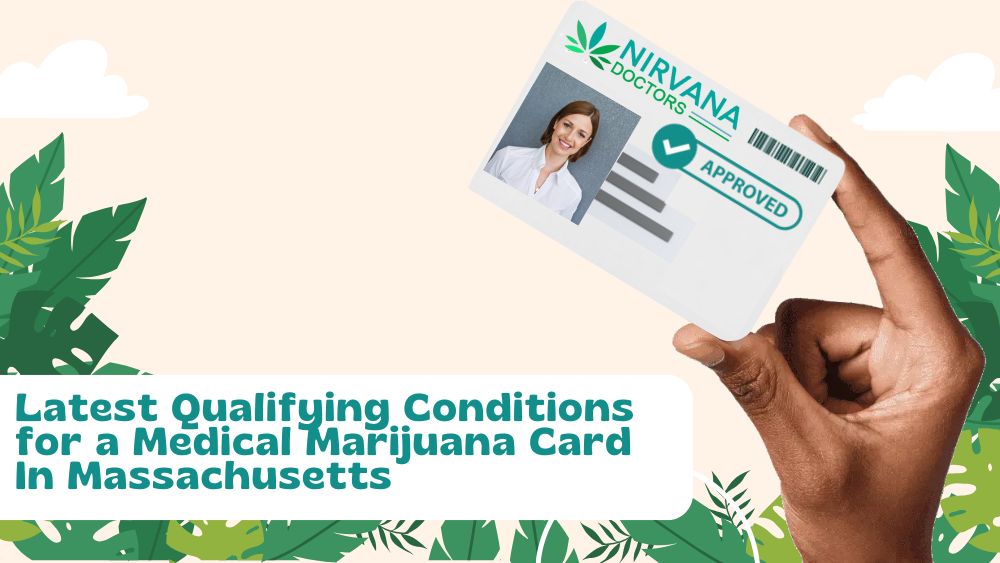Overview of the Massachusetts Program
The Massachusetts medical marijuana program was first established in 2012, legalizing the use of cannabis for patients with certain debilitating conditions. The program allows registered patients to purchase and use medical marijuana products from state-licensed dispensaries. Over the years, the program has expanded its list of qualifying conditions, improved patient access, and introduced new regulations aimed at ensuring safe and legal use of medical marijuana.
Updated Qualifying Conditions (2025)
As of 2025, Massachusetts has expanded its list of qualifying conditions for an MMJ card. The updated list includes both specific diseases and symptoms that significantly impact a patient’s quality of life. The qualifying conditions for 2025 are:
- Cancer
- Chronic pain
- Epilepsy and other seizure disorders
- Glaucoma
- HIV/AIDS
- Multiple sclerosis (MS)
- Parkinson’s disease
- Post-traumatic stress disorder (PTSD)
- Amyotrophic lateral sclerosis (ALS)
- Crohn’s disease
- Severe nausea
- Muscle spasms and spasticity
- Anxiety disorders (New in 2025)
- Autism spectrum disorder (New in 2025)
- Opioid use disorder (under certain conditions) (New in 2025)
The addition of anxiety disorders, autism spectrum disorder, and opioid use disorder reflects an increasing acknowledgment of how medical marijuana can help alleviate symptoms of mental health conditions and substance use disorders.
How to Apply for a Massachusetts MMJ Card: Step-by-Step Guide
Applying for an MMJ card in Massachusetts is a straightforward process. Here’s a step-by-step guide:
1. Consult a Licensed Healthcare Provider
The first step is to consult a licensed healthcare provider who can evaluate your medical condition. The healthcare provider must be registered with the Massachusetts Cannabis Control Commission (CCC) and be qualified to issue certifications for medical marijuana. It’s crucial to discuss your medical history and symptoms to determine if you qualify.
2. Receive Certification
Once the healthcare provider determines that you meet the qualifying conditions, they will issue a certification through the Massachusetts Medical Use of Marijuana Program. This certification is mandatory for moving forward with your application.
3. Register with the Massachusetts Cannabis Control Commission (CCC)
After receiving your certification, you need to register online with the CCC. This involves creating an account, submitting your certification, and providing proof of identity and Massachusetts residency (e.g., driver’s license, utility bill).
4. Pay the Application Fee
There may be an application fee when registering for an MMJ card. Check the latest fee structure on the CCC website to ensure you are prepared to make the payment.
5. Receive Your Medical Marijuana Card
Once your application is reviewed and approved, you will receive your medical marijuana card in the mail. With this card, you can purchase cannabis products from licensed dispensaries across Massachusetts.
Legislative Changes in 2025
In addition to updating the list of qualifying conditions, several legislative changes have been made in 2025:
- Increased access for minors: The law now allows minors with certain conditions (e.g., autism) to apply for a medical marijuana card with parental consent.
- Telemedicine expansion: Patients can now consult with healthcare providers through telemedicine platforms, making it easier for those with mobility issues or those living in remote areas to apply for an MMJ card.
- Protections for employment: New regulations prevent employers from discriminating against medical marijuana patients, provided they are not impaired at work.
These changes aim to enhance patient access to medical marijuana while ensuring that it remains safe and well-regulated.
Importance of Consulting a Licensed Healthcare Provider
Before applying for a medical marijuana card, it is essential to consult a licensed healthcare provider who understands the potential benefits and risks of using medical marijuana. Not all conditions respond to cannabis in the same way, and a healthcare provider can guide you on dosage, strains, and any possible side effects. They can also monitor your progress and adjust your treatment plan as needed.
FAQs about Medical Marijuana Cards in Massachusetts
- What is the minimum age to apply for an MMJ card in Massachusetts?
Patients must be 18 years old or have parental consent if under 18. - Can I use an out-of-state MMJ card in Massachusetts?
No, out-of-state medical marijuana cards are not accepted. - How long is the MMJ card valid?
Typically, an MMJ card is valid for one year and must be renewed annually. - What is the cost of applying for an MMJ card?
The application fee varies; check the latest updates on the CCC website. - Are anxiety and PTSD qualifying conditions in 2025?
Yes, both anxiety disorders and PTSD are qualifying conditions as of 2025. - Can I grow my own cannabis with an MMJ card?
Yes, patients can grow a limited number of plants for personal use, subject to state regulations. - Is telemedicine available for MMJ consultations?
Yes, telemedicine consultations are allowed as of 2025. - Are there any employment protections for MMJ patients?
Yes, new laws protect patients from workplace discrimination, provided they are not impaired at work. - Do I need to renew my healthcare certification each year?
Yes, you must renew your healthcare provider certification annually. - Can minors apply for an MMJ card?
Yes, with parental consent, minors with qualifying conditions like autism can apply.
